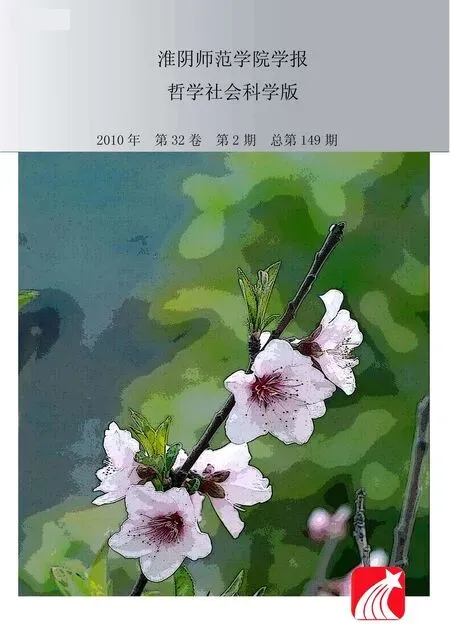王洋生平二考
2010-04-11金鑫
金 鑫
(延边大学 中文系,吉林 延吉 133002)
王洋生平二考
金 鑫
(延边大学 中文系,吉林 延吉 133002)
王洋是宋代诗人,著有《东牟集》,周必大曾为其文集作序。学术界对于王洋生年向有争论,对于其举家奔淮的时间与原因则多含混之词。经考证:王洋生年应为 1089年,举家奔淮时间应为 1107年,而遭祸之由当是其父王资深坐张怀素道术书案,贬职新州。
王洋;生年;奔淮
王洋 (1087—1154),字元渤,宋代诗人。原籍山东东牟 (今山东蓬莱),因父遭祸,而举家奔淮。后迁居山阳 (今江苏淮安)。王洋晚年寓居信州,有荷花水木之趣,因号王南池,亦自称王半僧或半僧寮。
王洋为人耿介尚直。南宋丞相周必大赞其“仕可屈,身不可屈;食可缓,道不可缓”,仕途上可以受委屈,但人格不能受屈辱;饮食可以迟缓,但道义不可有丝毫通融,可见其品德操行之美。有《东牟集》三十卷行世。《宋史·艺文志》列其目为二十九卷,众人以为误。明代以来世上罕见其传本选录,独《永乐大典》各韵中散见颇多。清代编纂的《四库全书》,从《永乐大典》中辑出大部分诗文,编为十四卷。卷一至卷六收古今体诗 713首,卷七至卷十四收各种文体 344篇。
目前所见的王洋研究资料,对于王洋生年的说法难以统一,而举家奔淮的原因及时间也常是含混不清。今据阅读所见,略加考订如下,以求教于方家。
一、王洋生年考
对于王洋生年的推测,主要有两种看法:
一是姜亮夫先生认为,王洋当生于宋神宗元丰七年 (1084)。其《历代人物年里碑传综表》[1]言见其文《王洋疑年考》,然在《姜亮夫全集》中未见其文。王洋为宣和六年 (1124)沈晦榜榜眼①,其诗云:“年将四十偶占第”(《寄曹嘉父》),意其登科之年将及 40岁。倘若依姜亮夫先生之论,王洋生于神宗元丰七年 (1084),则王洋进士及第之年已经 41岁了,与其诗不符。故以此说为误。
二是孔凡礼、傅璇琮、郑骞等认为王洋当生于元祐二年(1087)。孔凡礼编纂《宋代文史论丛》云:“王洋 (1087—1154),字元勃 (渤 )……”[2]傅璇琮主编《全宋诗》录“王洋(1087? —1154?),字元渤 ……”[3]《全宋诗 》虽对王洋生年略有疑问,但仍然把其生年定为公元 1087年,故也将其归为此类。郑骞《宋人生卒考示例》录“王洋,元渤,山阳。约六十七。约宋哲宗元祐二年丁卯 (1087)—高宗绍兴二十三年癸酉 (1153)”[4],仍以王洋诗“年将四十偶占第”(《寄曹嘉父》)为据,认为王洋生年最早可推定元祐元年 (1086),其及第时,年 39岁。再早则与王洋诗不符,上下相差不过一二年矣。此推论较为有理,但并不是确切的结论。
今查王庭珪《庐溪文集》有《王舍人生辰作》一首:“己巳四月二十四,甲子夜半天门开。是时群星环北斗,一星谪堕人间来……”诗专为王洋生辰而作,明言他生于元祐四年 (1089)四月二十四日,当为准确无误的表述。王庭珪(1080—1172),字民瞻,号庐溪真逸,吉州安福(今属江西)人。政和八年进士。宣和初,调衡州茶陵县丞。宣和末退居乡里。绍兴中,胡铨上疏斥乞斩秦桧,贬新州编管。庭珪独以诗送,有“痴儿不了公家事,男子须为天下奇”句,一时名满天下。后坐此而贬编管辰州。秦桧死,许自便。孝宗召对,除国子监主簿。以年老力辞,主管台州崇道观。乾道再召见,除直敷文阁。乾道八年卒。享年九十三岁。著《庐溪文集》传世。绍兴九年 (1139),王洋守吉州,初适名邦,闻王庭珪乃圣世之才,安贫守节,养恬躬幽,郡人仰慕至极。遂虚齐相之堂,以礼币邀王庭珪,延访政事。一时士大夫多为歌诗纪此宾主之两贤。各自诗集、文集中对此都有记述。王庭珪《庐溪文集》中《答王元渤舍人书》二篇、《与周秀实监丞书》,王洋《东牟集》存《招安福人士王丞民瞻启》皆存此事。且宋周必大《直敷文阁王公 (庭珪)行状》、胡铨《王公 (庭珪)墓志铭》亦对此颇为称赞。二人此后交谊甚密。王庭珪《庐溪文集》中存《六月上干陪王元渤舍人携客游青原山周秀实通判作韵语纪一时胜集奉次元韵》、《游青原呈王元渤舍人、周秀实监丞》、《陪元渤舍人、秀实监丞游徹见阁》等。以二人之交谊,此说应该是准确的。且《王舍人生辰作》必是送王洋过目的,如有失误,必能得到王洋的纠正。
有鉴于此,笔者以为王洋当生于 1089年,则及第之时 (1124)为 36岁,与“年将四十偶占第”之语也无龃龉。
二、王洋举家奔淮考
王洋原籍山东蓬莱,其《叶子发〈珠玉集〉序》中却有“予少长江淮”之语,而《东牟集》中也有多篇诗歌作品谈到其举家奔淮之事。如:“野人本住蓬莱侧,寄籍淮甸老阡陌”(《赠向扬州》);“我家盗焚先子业,每仗馀德宽天诛。悲伤扶病别邻里,崎岖仅得来东吴”(《寄廉宣仲》);“我家旧往长淮湄,花开十丈芙蓉旗”(《偶得上饶芡实颇佳分荐同邑以诗送》);“我年二十始冠弁,一门婴祸奔淮隅”(《寄曹嘉父》);更有《送乡僧证缘归山阳》,认山阳之僧为乡僧。然而究竟因何事“婴祸”、于何年举家奔淮,则皆含糊不清。
今据有关资料,可以证实:王洋举家奔淮因其父王资深故。
王资深,字取道,元祐二年 (1087)进士。著《方言》、《周书》。纵观有关史料记载,王资深其官最早为尚书郎,后为御史。其官御史时,敢于直言,首论“一二大臣丑状”。时蔡京用事,使人通款资深,曰“谨勿言,当以此位相处”[5]。王资深不应。其后王资深出知扬州,未几改知明州 (浙江宁波)。按《江苏省通志稿·大事志》:“是年 (崇宁二年)宣德郎朱彦知江宁。蒋之奇知扬州,寻迁。王资深代。”[6]
李之亮《宋两浙路郡守年表·明州·宝庆府》:“崇宁二年癸未 (1103)陆傅、王资深。《宝庆志》:‘王资深,集贤殿修撰。崇宁年。’在陆傅后一人。崇宁三年甲申 (1104)王资深。崇宁四年乙酉 (1105)王资深、叶棣。《宝庆志》:‘叶棣,曾任吏部员外郎。崇宁年。’在王资深后一人。”[7]270王资深虽得罪奸臣蔡京,而其出知扬州、明州,也不算为遭难。
其后王资深于徽宗崇宁四年 (1105)以显谟阁待制知越州(浙江绍兴)。按吴廷燮《北宋经抚年表 ·南宋经抚年表》:“(崇宁)四年(1105)王资深。四月,王资深知越州,以显谟阁待制知。”[8]李之亮《宋两浙路郡守年表·越州·绍兴府》:“崇宁四年乙酉 (1105)王资深。《会稽志》:‘崇宁四年四月以承议郎、充显谟阁待制知’。崇宁五年丙戌 (1106)王资深。大观元年丁亥(1107)王资深、钱迩。《会要·选举》三三之二五:‘(大观元年)十二月八日,朝奉郎、知秀州钱迩为集贤殿修撰、知越州’。”[7]63
由此可见,徽宗大观元年 (1107)十二月王资深已不事越州。而清人徐松《宋会要辑稿·职官六八之一四》:“(大观元年五月)四日权密直学士朝散大夫提举西京嵩山崇福宫王能甫落职。朝议大夫吕渊降。承事郎王沩之并特追毁出身以来文字,除名,勒停免直决不刺面。(吕)渊配沙门岛,沩之配朱崖军。承议郎显谟阁待制知密州王资深特责授衡州司马,新州安置……”[9]即大观元年 (1107)五月王资深谪官知新州。按同治《重修山阳县志》:“时有张怀素者授资深道术书,不启封。既而诏捕怀素。一时朝士多罹极刑。资深独事状明白,犹以此追秩安置新州。”[10]故以此事,王洋等举家奔淮,当无误。王洋等所奔之处,乃楚州山阳徐积处。徐积 (1028—1103),字仲车,山阳人,与王资深为姻家。《金鱼袋王资深撰行状》:“(王)资深于先生 (徐积)实为姻家。”[11]徐积、王资深既为“姻家”,王家遭难,王洋等举家投奔,便是很自然的事。尽管当时徐积已经亡故,但其后人仍在,故仍不失为投托的首选之处。而此年王洋已 19岁,与其诗“我年二十始冠弁,一门婴祸奔淮隅”之语亦无龃龉。
注 释:
① [宋 ]陈骙《南宋馆阁录 》:“王洋,字元渤,山阳人,沈晦榜进士及第。”
[1] 姜亮夫全集出版委员会.姜亮夫全集:第 19册[M].昆明:云南人民出版社,2002:384.
[2] 孔凡礼.宋代文史论丛 [M].北京:学苑出版社,2006:68.
[3] 傅璇琮.全宋诗.王洋 [M].北京:北京大学出版社,1998:18917.
[4] 郑骞.宋人生卒考示例 [M].台北:华世出版社,1977:66.
[5] 四库全书存目丛书编纂委员会.四库全书存目丛书:第 91册:史部 [M].济南:齐鲁书社,1996:173.
[6] 江苏省地方志编纂委员会办公室.江苏省通志稿 1[M].南京:江苏古籍出版社,1991:255.
[7] 李之亮.宋两浙路郡守年表 [M].成都:巴蜀书社,2001.
[8] 吴廷燮.北宋经抚年表.南宋经抚年表:卷四[M].张忱石,校.北京:中华书局,1984:280.
[9] [清 ]徐松.宋会要辑稿 [M].北京:中华书局,1957:3195.
[10] [清 ]张兆栋,丁晏,等.同治重修山阳县志 [M].刻本影印,同治十二年 (1873).
[11] [宋 ]徐积.节孝集附录:卷三十二 [M].上海:上海古籍出版社,1987:981.
Abstract:Based on the theory of transitivity in Halliday’s systemic-functional grammar,the paper is intended to disclose the ideologicalmeaning hidden in the English news.The paper included three parts:Part one is a brief introduction about the theory of transitivity;Part two is about the important role transitivity plays as the analytical tool for critical linguistics;Part Three is about the comparative analysis of two English news in China Daily and The New York Timeswith transitivity.Through the study,it reveals that how the utterance is controlled by the ideology.
Key words:transitivity;English report news;criticism linguistics;ideology
The Origin,M orphology and I nfluence of the Poem s of Supernatural Beings in Han Dynasty
ZHANG Shu-guo
(Research Centre ofAncientLiterature and Document,Hangzhou Nor malUniversity,Hangzhou,Zhejiang 310036,China)
The idea of Supernatural beings which reflected three aspects:belief,ritual and primitive skills,stemmed from the primitive shamanis m and Taoist,and determined the direction of the poemsof Supernatural beings in Han dynasty.In the t ime of the Emperor ofWu of Han dynastywhich in use of offering sacrifices and making great religion ceremonies to Deities to pray for prolongation of life and immortal,which perfectly reflected in the Odes of offering sacrifices.Simultaneously the poems of Supernatural beingswere artistic consumer goods in banquet ceremonies in Han dynasties.So these poems had three characteristics of ritualistic and perform and presentation andwas an important stage from cited Chu-ci Yuan-You toWei-Jin dynasties.The poems of Supernatural beingswere important patterns of ancient romanticis m of China.
the poemsof Supernatural beings;morphologyof ritual;morphologyof text;music and dance of Supernatural beings
Supplementary to the Thwan and Yao-On Khien and On Khwan:the Source of Ch inese L iterature
HUANGLi-xing
(Institute of Zhouyi of College of Chinese Language and Literature,Fujian NormalUniversity,Fuzhou,Fujian 350007,China)
Abstract:The"Supplementary to the Thwan and Yao-On Khien and On Khwan"with a thousand words explains respectively the meanings of Hexagrams Khien and Hexagrams Khwan.The philosophy of the"Supplementary to the Thwan and Yao-On Khien and On Khwan"On Khien and On Khwan is extended broadly and its articles are famous for the marked rhetoric and literary grace,which can be regarded as themodelof future literaryworks."Supplementary to the Thwan and Yao-On Khien and On Khwan"is splendid and rhetorical speech,which has been treated as the source of Chinese Literature.
Key words:Supplementary to the Thwan and Yao-On Khien and On Khwan;philosophy;rhetoric;literary
Aesthetic and Aesthetic History Sign ificance of"Adopt Symbols by Watching"and"Express Ideas by Setting up Symbols"
XIE Jun
(Humanities College,Yanbian University,Yanji,Jilin 133002,China)
Abstract:Two important propositions of"adopt symbols bywatching"and"express ideas by setting up symbols"have aesthetic significance and aesthetic history significance.These two propositions have their own respectively aesthetic connotation,and in together,they constitute a complete theory of artistic creation."Adopt symbols bywatching"deeply impacts on future generations of Chinese aesthetic thought in two sides of art origin and aesthetic way;"express ideas by setting up symbols"firstly clearly explains the relationship between"speech","symbol"and"idea"and far-reaching impacts on future generations’discussion of the relationship between these three factors,and thus inspiresmany aesthetic propositions and scopes.
Key words:"adopt symbols bywatching";"express ideas by setting up symbols";"Yi Zhuan"
The Textual aboutWang Yang’sL ife
J IN Xin
(School of Chinese Language and Literature,Yanbian University,Yanji,Jilin 133002,China)
Abstract:Wang Yangwas a poet of the SongDynasty,author of"EastMou Series".Zhou Bida wrote a preface for his literary works.The academic circles have some different views on Wang Yang’s lifet ime.The t ime and the reason of seeking shelter at Huai with his family seem ambiguous.The textual showsWang Yangwas born in 1089 and He seek shelter atHuaiwith his family in 1107 because his fatherwas demoted to Xin Zhou.
Key words:Wang Yang;lifetime;seek shelter at Huai
Ideological Sign ificance of English News from the Perspective of Transitivity
ZHANG Yan
(School of Foreign Languages,JinLing Institute of Technology,Nanjing,Jiangsu 211169,China)
I207.2 < class="emphasis_bold">文献标识码:A文章编号:
1007-8444(2010)02-0262-02
2009-11-02
金鑫 (1983-),女,吉林白城人,硕士研究生,主要从事唐宋文学研究。
责任编辑:刘海宁
